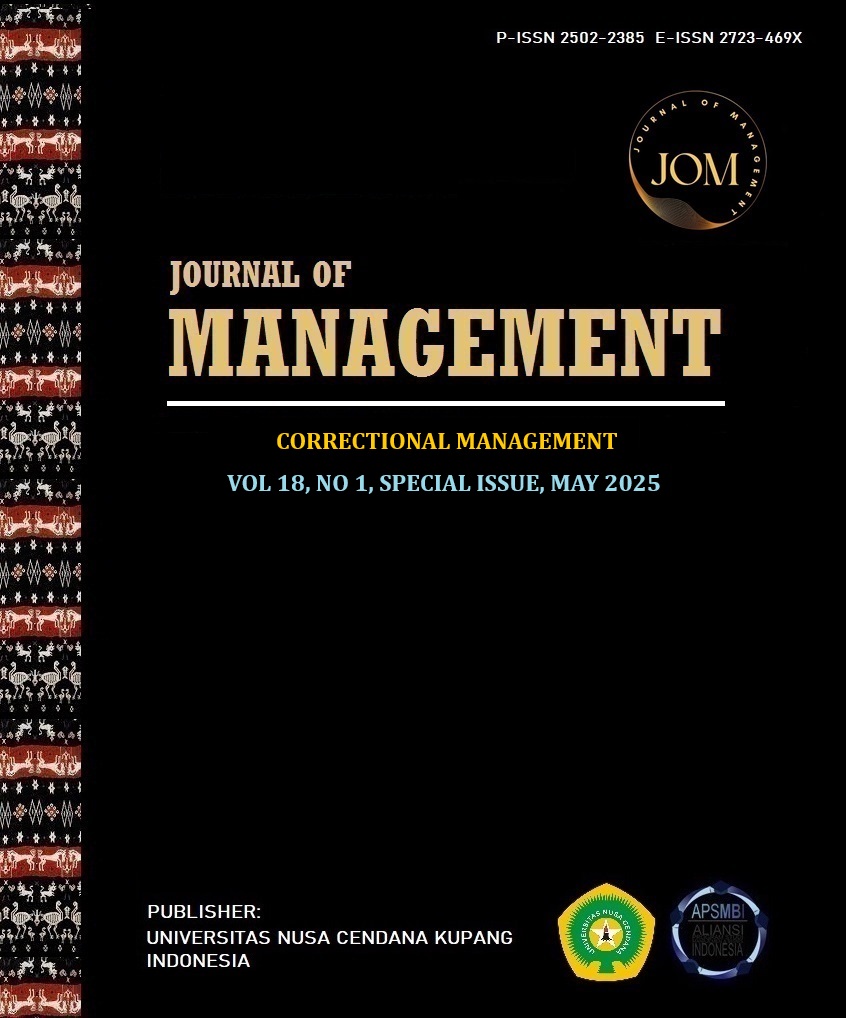THE ROLE OF COMMUNITY COUNSELORS AS CASE MANAGERS IN EMPOWERING CORRECTIONAL CLIENTS AT THE CORRECTIONAL CENTER CLASS I SURAKARTA
Abstract
This research aims to analyze the role of community counselor as case manager in empowering correctional clients at the Surakarta Class I Correctional Center. The background of this research focuses on the importance of social reintegration for post-conviction clients to restore their social identity and prevent repeat offenses. This research uses qualitative methods with data collection techniques through observation, in-depth interviews, FGDs, and literature studies and is based on Bronfenbrenner's Ecological Theory. The results showed that community counselors play an important role as mediators, facilitators, and advocates in the client reintegration process. Community support and appropriate government policies also play a crucial role in reducing social stigma and accelerating the reintegration process. However, limited resources and community stigma are the main obstacles that hinder client empowerment. A comprehensive coaching program is considered essential to increase clients' independence and reintegrate them into the community.
Keywords: Empowerment ;Social Reintegration; Community Counselor
Downloads
References
Amri, I. A., Hasmin, & Sani, A. (2016). Pengaruh Motivasi Individu, Dukungan Keluarga Dan Lingkungan Sosial Terhadap Peningkatan Keberhasilan Rehabilitasi Di Wilayah Kerja Badan Narkotika Nasional Provinsi Sulawesi Selatan. Jurnal Mirai Management, 1(462–479). https://doi.org/10.1234/MIRAI.V1I2.26
Aprilyaningtiyas, H. D., Pristiwanti, Y., & Laksana, E. P. (2023). Konsep dan Praktek Konseling Adlerian untuk Mencapai Tujuan dan Pemahaman Diri yang Lebih Baik. Jurnal Pembelajaran, Bimbingan, Dan Pengelolaan Pendidikan, 3(11), 1003. https://doi.org/10.17977/um065v3i112023p1001-1008
Kusnadi, S. K., Irmayanti, N., Anggoro, H., & Agustina, K. S. B. (2021). Hubungan Antara Dukungan Keluarga Dengan Psychological Well-Being Pada Orang Tua Yang Memiliki Anak Tunagrahita Sedang. Jurnal Psikologi Insight, 5(1), 79–86. https://doi.org/10.17509/insight.v5i1.34240
Lukersmith, M. S., Millington, M., & Salvador-Carulla, L. (2016). What is case management? A scoping and mapping review. International journal of integrated care, 16(4).
Sudirman, K. A., & Sulhin, I. (2019). Mekanisme Mengatasi Stigma di Kalangan Klien Pemasyarakatan (Studi Kasus Klien Narkoba Di Balai Pemasyarakatan Kelas I Jakarta Selatan). Journal of Correctional Issues Volume, 2(2).
Sunaringtyas, W., & Sulisno, M. (2015). Strategi case manager dalam mengelola kasus pasien rawat inap di Rs B Kediri. The Indonesian Journal of Health Science, 6(1).
Tamimi, S. F., & Humaedi, S. (2017). Manajemen Kasus Tindak Kekerasan Anak di Pusat Pelayanan Terpadu Pemberdayaan Perempuan dan Anak P2TP2A Provinsi DKI Jakarta. Prosiding Penelitian dan Pengabdian kepada Masyarakat, 4(1), 115
Thahir, A. (2018). Psikologi Perkembangan. www. penerbitan aura. com.
Utoyo, M. (2015). Konsep pembinaan warga binaan pemasyarakatan analysis of prisoners guidance to reduce level. Pranata Hukum, 10(1).
Visher, C., & Courtney, S. M. (2016). One year out: Experiences of prisoners returning to Cleveland.
Yona, S. (2006). Penyusunan studi kasus. Jurnal Keperawatan Indonesia, 10(2), 76-80.
Yunengsih, S., & Syahrilfuddin, S. (2020). the Analysis of Giving Rewards By the Teacher in Learning Mathematics Grade 5 Students of Sd Negeri 184 Pekanbaru. JURNAL PAJAR (Pendidikan Dan Pengajaran), 4(4), 715.

 Isti Chomah(1*)
Isti Chomah(1*)



